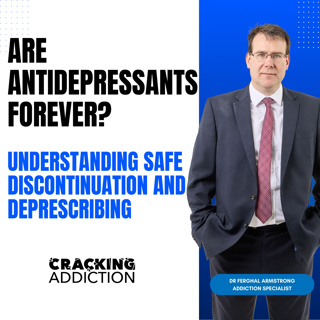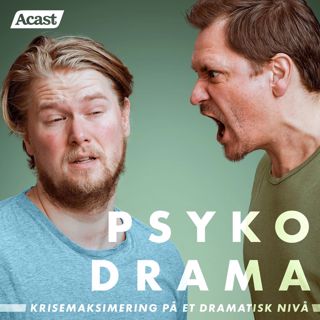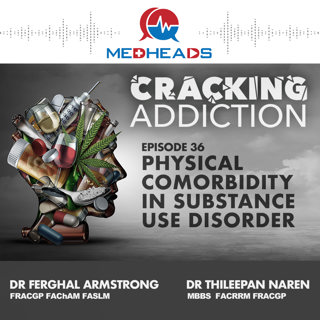
Physical comorbidity in substance use disorder
In episode 36 of Cracking Addiction we discuss in detail some of the physical comorbidities associated with substance use disorders and what to screen for, be aware of and some management techniques.People with substance use disorders often deal with many medical and physical issues that can impact both their quality of life but also increase the risks of morbidity and mortality. There are a number of medical and physical conditions that could be discussed but for the sake brevity this blog post will detail the following:• Chronic pain• Tobacco use• Infectious diseases• Chronic NSAID toxicityChronic painChronic pain alters brain’s stress and reward systems and increases the risk for developing an opioid use disorder. It is thought that up to 30% of chronic pain patients misuse prescription opioids and this is becoming an increasingly problematic matter within society. Recent data and statistics reveal that prescription drug deaths in Victoria now exceed the road toll. The treatment and management of chronic non-cancer related pain is now moving away from a medication centred approach and indeed chronic opioid medication usage are associated with long-term harms within this group including increased risks of opioid induced hyperalgaesia, osteoporosis and hypothalamic pituitary gonadal axis dysfunction. The management of chronic non-cancer related pain now increasingly centres around active pain management strategies, physical therapy, allied health input and rehabilitation activities.Tobacco useMany patients with substance use disorders smoke tobacco and broaching smoking and tobacco cessation is important to improving the overall health and wellbeing of the patient. Oftentimes it appears other drugs and substances take priority of tobacco usage but tobacco usage is also associated with significant harms to the patient. It is important to discuss the harms of smoking with patients with substance use disorders and offer smoking cessation interventions. Tobacco usage is responsible for the majority of lung cancer and approximately one-third of all cancer related deaths. Tobacco use is also directly responsible for: cardiovascular disease, reduced immunity, poor wound healing, age related macular degeneration and worsening chronic pain.Infectious diseasesPatients with substance use disorder are at increased risk of some infectious diseases and it is important to screen people appropriately. In particular people who inject drugs and share needles or who engage in commercial sex work to pay for drugs require screening for blood borne viruses and the latter group in particular will require a thorough sexually transmitted infection screen. Blood borne virus screening includes screening for Hepatitis B, C and HIV and STI screening includes screening for chlamydia, gonorrhoea and syphilis in the first instance.People who inject drugs are also at risk of skin infections and abscesses as a result of injecting drug use and skin examination should be carried out periodically to exclude thrombophlebitis in veins, cellulitis and one should always consider the risks of infective endocarditis in the appropriate clinical scenario. It is important to be thorough and systematic in our physical examination of our patients and when ordering tests so as not to miss an important medical diagnosis.Chronic NSAID toxicityCodeine misuse and dependency associated with chronic non-steroidal anti-inflammatory drug (NSAID) toxicity. NSAIDS can ulceration of the gastrointestinal tract which can lead to bleeding and even perforation of the gastrointestinal tract in severe circumstances. Chronic NSAIDs usage can lead to iron deficiency with or without anaemia due to bleeding from the gastrointestinal tract. Chronic NSAID usage can also lead to recurrent metabolic acidosis and also cause significant renal impairment and lead to NSAID nephropathy...
20 Apr 202224min
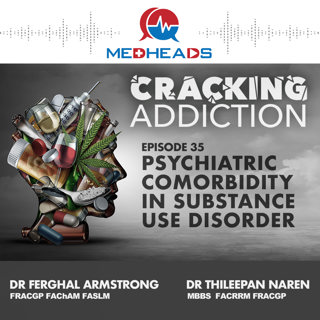
Psychiatric comorbidity in substance use disorder
In episode 35 of Cracking Addiction we discuss in detail some of the psychiatric comorbidities associated with substance use disorders and what to screen for, be aware of and some management techniques.Discussions and comments in our videos are for informational purposes only and should not replace the advice of your medical professional. Please consult with your doctor before making any changes to your medical treatment or lifestyle.Latest Blogshttps://www.meducate.com.au/blogAbout Meducate ®Meducate provides online education for doctors, clinicians, health professionals and the public.See the website to browse the many different talks and courses available https://www.meducate.com.au
13 Apr 202223min
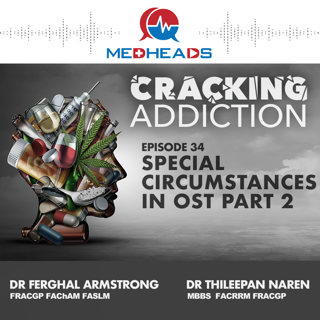
Special circumstances in OST Part 2
In episode 34 of Cracking Addiction we discuss how to manage some of the special circumstances in opioid substation therapy including OST in renal and hepatic impairment, managing polypharmacy complications with OST and managing acute pain whilst a patient is on OST.Discussions and comments in our videos are for informational purposes only and should not replace the advice of your medical professional. Please consult with your doctor before making any changes to your medical treatment or lifestyle.Latest Blogshttps://www.meducate.com.au/blogAbout Meducate ®Meducate provides online education for doctors, clinicians, health professionals and the public.See the website to browse the many different talks and courses available https://www.meducate.com.au
6 Apr 202218min
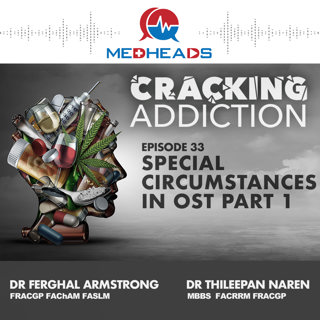
Special circumstances in OST Part 1
In episode 33 of Cracking Addiction we discuss how to manage some of the special circumstances in opioid substation therapy including vomiting of doses of OST, dealing with intoxicated patients, overdoses of OST and transitioning between Methadone and Suboxone and vice versa.Discussions and comments in our videos are for informational purposes only and should not replace the advice of your medical professional. Please consult with your doctor before making any changes to your medical treatment or lifestyle.Latest Blogshttps://www.meducate.com.au/blogAbout Meducate ®Meducate provides online education for doctors, clinicians, health professionals and the public.See the website to browse the many different talks and courses available https://www.meducate.com.au
30 Mar 202224min
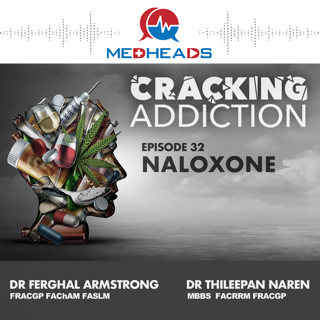
Naloxone
In episode 32 of Cracking Addiction we discuss the harm reduction intervention of Naloxone and when to consider prescribing this medication, the benefits of take home naloxone and how it saves lives!Discussions and comments in our videos are for informational purposes only and should not replace the advice of your medical professional. Please consult with your doctor before making any changes to your medical treatment or lifestyle.Latest Blogshttps://www.meducate.com.au/blogAbout Meducate ®Meducate provides online education for doctors, clinicians, health professionals and the public.See the website to browse the many different talks and courses available https://www.meducate.com.au
23 Mar 202221min
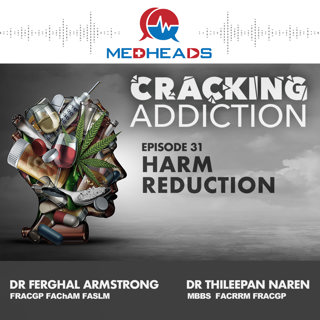
Harm Reduction
In episode 31 of Cracking Addiction we discuss the harm reduction interventions that we can implement for people who inject drugs to decrease the risks of morbidity and mortality.Discussions and comments in our videos are for informational purposes only and should not replace the advice of your medical professional. Please consult with your doctor before making any changes to your medical treatment or lifestyle.Latest Blogshttps://www.meducate.com.au/blogAbout Meducate ®Meducate provides online education for doctors, clinicians, health professionals and the public.See the website to browse the many different talks and courses available https://www.meducate.com.au
16 Mar 202226min
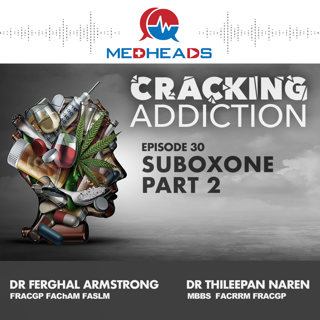
Suboxone Part 2
In episode 30 of Cracking Addiction we discuss the different opioid receptors buprenorphine acts upon and the nature of these effects, the difference between agonists and antagonists, how to start a patient on Suboxone and how to monitor patients on Suboxone and adjust doses.Discussions and comments in our videos are for informational purposes only and should not replace the advice of your medical professional. Please consult with your doctor before making any changes to your medical treatment or lifestyle.Latest Blogshttps://www.meducate.com.au/blogAbout Meducate ®Meducate provides online education for doctors, clinicians, health professionals and the public.See the website to browse the many different talks and courses available https://www.meducate.com.au
9 Mar 202222min
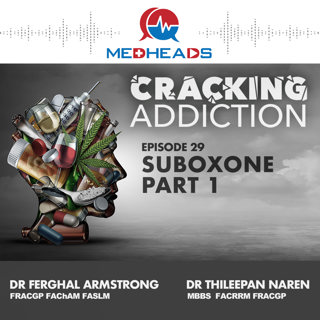
Suboxone Part 1
In episode 29 of Cracking Addiction we discuss Suboxone and talk about the components of Suboxone as well as the pharmacology and pharmacokinetics of Suboxone.Discussions and comments in our videos are for informational purposes only and should not replace the advice of your medical professional. Please consult with your doctor before making any changes to your medical treatment or lifestyle.Latest Blogshttps://www.meducate.com.au/blogAbout Meducate ®Meducate provides online education for doctors, clinicians, health professionals and the public.See the website to browse the many different talks and courses available https://www.meducate.com.au
2 Mar 202218min
